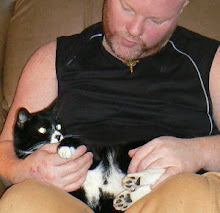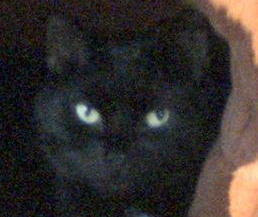I recently attended the 2008 OCLC Western Conference in Seattle. OCLC is the Online Computer Library Center—the folks who bring us WorldCat—and this year's conference theme, in keeping with their new logo, was "The World's Libraries. Connected." The all-day event had a huge focus on how libraries can "build a bigger sign" in the community and on the world's information highway. Among many interesting facts, I learned the following: fully 13 percent of library users and potential library users surveyed in the Pew Internet & American Life Project expect - EXPECT - libraries to have a presence on social networking sites like Facebook. Seems like a phenomenal number to me.
Who uses the library?
What do library users want and expect?
What attracts people to libraries?
What makes them come back?  The OCLC conference addressed these questions and provided some interesting resources for answers. I hope to find time to share some of these next week. But for now, the sun is shining, and 8-Ball wants attention. Outside. Now. No crows invited. Crows like to gang up, corner 8-Ball under bushes, and taunt him. But that's another story for another day. Have a beautiful Sunday.
The OCLC conference addressed these questions and provided some interesting resources for answers. I hope to find time to share some of these next week. But for now, the sun is shining, and 8-Ball wants attention. Outside. Now. No crows invited. Crows like to gang up, corner 8-Ball under bushes, and taunt him. But that's another story for another day. Have a beautiful Sunday.
Sunday, February 17, 2008
Lucky 13: Libraries and Social Networking Sites
Sunday, February 10, 2008
Facebook rocks with Books iRead
Are you a fan of LibraryThing? Are you tired of keeping track of half a dozen little slips of paper with books you want to read?
If you answered yes to either of these questions, you might want to check out Facebook's Books iRead application. With Books iRead, not only can you build your library online, you can EASILY sort and organize your library around books you want to read, books you're currently reading, books you've read, books you own, and personal favorites. You can also recommend books to other friends on Facebook with one click, write online reviews, review lists of customized recommendations based on your favorites, and check out all your friends' favorites and reviews. Just brainstorming... you can even use iRead for finding read-alikes. For example, I put in M. John Harrison, and it recommended a similar writer of post-cyberpunk speculative fiction, China Mieville (both, as it happens, purveyors of what Martha Bayley at her recent Science Fiction Readers Advisory called The New Weird). How cool is that?
For those of you still hesitating to join Facebook, hesitate no more. The Books iRead application alone is worth the price of admission, a real must for bookophiles. Oh, and yeah, there IS no price of admission. Facebook is free.
If you answered yes to either of these questions, you might want to check out Facebook's Books iRead application. With Books iRead, not only can you build your library online, you can EASILY sort and organize your library around books you want to read, books you're currently reading, books you've read, books you own, and personal favorites. You can also recommend books to other friends on Facebook with one click, write online reviews, review lists of customized recommendations based on your favorites, and check out all your friends' favorites and reviews. Just brainstorming... you can even use iRead for finding read-alikes. For example, I put in M. John Harrison, and it recommended a similar writer of post-cyberpunk speculative fiction, China Mieville (both, as it happens, purveyors of what Martha Bayley at her recent Science Fiction Readers Advisory called The New Weird). How cool is that?
For those of you still hesitating to join Facebook, hesitate no more. The Books iRead application alone is worth the price of admission, a real must for bookophiles. Oh, and yeah, there IS no price of admission. Facebook is free.
Labels:
Books iRead,
Facebook,
LibraryThing,
new weird,
science fiction,
Web 2.0
Saturday, February 9, 2008
Heinlein: My Struggles with the (quote/unquote) Master
Or a thousand and one ways to offend....
Those blog-readers who occasionally glance at my side bar may notice that I appear to have been reading science fiction luminary Robert A. Heinlein’s The Moon Is a Harsh Mistress for about two months. I have to admit I’ve been struggling with this book for a long time now, and not to be disrespectful to an acknowledged master in the SF genre or to his many devoted fans, I am inclined to bestow on it what noted SF writer and critic Thomas M. Disch might call a St. Bradbury.
The feast of St. Bradbury, Disch says, is when critics, readers, and reviewers gather up all the books they’ve been “unable, despite their best intentions and firmest resolves, to read all the way to the end,” and ceremoniously dispose of them. Disch puts it a bit more caustically, but like I said I don’t want to be disrespectful, since, despite what for me is a difficult roadblock on the Heinlein highway, I acknowledge there must be something good to account for Heinlein’s amassed critical and popular following.
So what’s my problem? Let’s just say that with The Moon Is a Harsh Mistress, considered by most critics and many readers to be Heinlein’s finest, the gender issue once again raises its ugly head. Not half a dozen pages can pass in this avowedly political novel, without the male characters’ lengthy verbal and visual ogling of the female characters, and the female characters then simpering, giggling, and cooing their appreciation of the men’s appreciation. And this is generally DURING any of said political and philosophical conversations, although fortunately not so much during the action sequences, comprised so far in my reading of political rallies meeting with government reprisal, strongly flavored by the novel’s 1960’s origins.
All of this “he looked her up and down, and whistled”—followed by four or five paragraphs of extraneous flirtation—wouldn’t be so bad if Heinlein didn’t seem so bent on generalizing about what women think (and, believe me, Heinlein has NO problem writing with paranormal authority on what women think) and how women are different–which so far in my reading mostly seems to involve a propensity for intuition and girlish gossip, occasional short-lived and inexplicable (yet adorable) flirtatious huffs, and an abiding love of compliments.
Now, don’t mistake me, Heinlein may be a product of his times, but he is no misogynist. To quote Disch once again, Heinlein is more than eager to grant women “equal wages and equal fun” and a certain naïve amount of mental acuity. To cite another of Heinlein’s well-loved novels, Stranger in a Strange Land presents a passel of female character, all of them nurses and secretaries, but at least he gives a few of them eidetic memories, plenty of smarts, and great job skills. Conveniently, as we are at length informed, they are also extremely attractive. But then, as Heinlein says in Moon, there are no ugly women.
The Moon Is a Harsh Mistress is the story of political dissent and government rebellion at a former penal colony on the moon; it is also the story of a computer achieving consciousness. Is the computer “Mike” really a Michelle? Heinlein’s characters must, of course, dicker about this, since they have crystal clear ideas about gender differences, even when talking about banks of electronic controls. For myself, I will continue to struggle with both the book and its ideas, at least until the traditional date set for the feast of St. Bradbury, August 22 (“the great man’s birthday,” as Disch reminds us), or until someone or something pushes me to read past my roadblocks. I am hoping with an idealistic postmodern gusto that our hero and heroine will finally realize that Mike/Michelle’s identity changes depending on his/her audience and that that in itself is an indication of the social constructs of gender reflected in the novel and its characters. Then, at last, I will be able to pitch my tent in Heinlein’s camp.
I am not holding out strong hopes for this eventuality. Still, if there are any readers out there who have read The Moon Is a Harsh Mistress and are up for debate, I am honestly open for discussion and ready to hear about the novel’s finer points, which I will then respectfully blog about to set the record straight. Push me to read a little faster. I am ready.
All quotes from Disch are from On SF (University of Michigan Press, 2005). Quote from The Moon Is a Harsh Mistress is from the Orb Edition (Tom Doherty Associates, 1997, copyright 1966), and appears on p. 71, among other pages.
Read more about Heinlein in the December 2007 Kitsap Sun: Heinlein: The Descent of a Sci-Fi Guru
Those blog-readers who occasionally glance at my side bar may notice that I appear to have been reading science fiction luminary Robert A. Heinlein’s The Moon Is a Harsh Mistress for about two months. I have to admit I’ve been struggling with this book for a long time now, and not to be disrespectful to an acknowledged master in the SF genre or to his many devoted fans, I am inclined to bestow on it what noted SF writer and critic Thomas M. Disch might call a St. Bradbury.
The feast of St. Bradbury, Disch says, is when critics, readers, and reviewers gather up all the books they’ve been “unable, despite their best intentions and firmest resolves, to read all the way to the end,” and ceremoniously dispose of them. Disch puts it a bit more caustically, but like I said I don’t want to be disrespectful, since, despite what for me is a difficult roadblock on the Heinlein highway, I acknowledge there must be something good to account for Heinlein’s amassed critical and popular following.
So what’s my problem? Let’s just say that with The Moon Is a Harsh Mistress, considered by most critics and many readers to be Heinlein’s finest, the gender issue once again raises its ugly head. Not half a dozen pages can pass in this avowedly political novel, without the male characters’ lengthy verbal and visual ogling of the female characters, and the female characters then simpering, giggling, and cooing their appreciation of the men’s appreciation. And this is generally DURING any of said political and philosophical conversations, although fortunately not so much during the action sequences, comprised so far in my reading of political rallies meeting with government reprisal, strongly flavored by the novel’s 1960’s origins.
All of this “he looked her up and down, and whistled”—followed by four or five paragraphs of extraneous flirtation—wouldn’t be so bad if Heinlein didn’t seem so bent on generalizing about what women think (and, believe me, Heinlein has NO problem writing with paranormal authority on what women think) and how women are different–which so far in my reading mostly seems to involve a propensity for intuition and girlish gossip, occasional short-lived and inexplicable (yet adorable) flirtatious huffs, and an abiding love of compliments.
Now, don’t mistake me, Heinlein may be a product of his times, but he is no misogynist. To quote Disch once again, Heinlein is more than eager to grant women “equal wages and equal fun” and a certain naïve amount of mental acuity. To cite another of Heinlein’s well-loved novels, Stranger in a Strange Land presents a passel of female character, all of them nurses and secretaries, but at least he gives a few of them eidetic memories, plenty of smarts, and great job skills. Conveniently, as we are at length informed, they are also extremely attractive. But then, as Heinlein says in Moon, there are no ugly women.
The Moon Is a Harsh Mistress is the story of political dissent and government rebellion at a former penal colony on the moon; it is also the story of a computer achieving consciousness. Is the computer “Mike” really a Michelle? Heinlein’s characters must, of course, dicker about this, since they have crystal clear ideas about gender differences, even when talking about banks of electronic controls. For myself, I will continue to struggle with both the book and its ideas, at least until the traditional date set for the feast of St. Bradbury, August 22 (“the great man’s birthday,” as Disch reminds us), or until someone or something pushes me to read past my roadblocks. I am hoping with an idealistic postmodern gusto that our hero and heroine will finally realize that Mike/Michelle’s identity changes depending on his/her audience and that that in itself is an indication of the social constructs of gender reflected in the novel and its characters. Then, at last, I will be able to pitch my tent in Heinlein’s camp.
I am not holding out strong hopes for this eventuality. Still, if there are any readers out there who have read The Moon Is a Harsh Mistress and are up for debate, I am honestly open for discussion and ready to hear about the novel’s finer points, which I will then respectfully blog about to set the record straight. Push me to read a little faster. I am ready.
All quotes from Disch are from On SF (University of Michigan Press, 2005). Quote from The Moon Is a Harsh Mistress is from the Orb Edition (Tom Doherty Associates, 1997, copyright 1966), and appears on p. 71, among other pages.
Read more about Heinlein in the December 2007 Kitsap Sun: Heinlein: The Descent of a Sci-Fi Guru
Subscribe to:
Comments (Atom)




.jpg)





.jpg)




